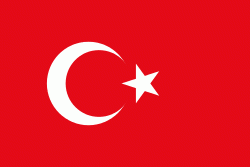Erzin (Erzin İlçesi)
Erzin is on the west-facing flanks of the Nur Mountains and runs down to the Gulf of İskenderun on the Mediterranean coast. The climate is warm and wet in winter, hot and extremely humid in summer, when most people retreat further up into the pine-covered hills, or to the beach.
Erzin is an attractive district well known for its high-quality citrus fruits, the major economic activity of the district. Grains and vegetables are also grown, especially since irrigation works were built in the 1960s. Today 65,000 m2 are planted with grains and another 65,000 m2 with all kind of citrus fruits including Navel orange, grapefruit and tangerines. Other income is generated by holidaymakers on the coast. The main road and the railway line between the cities of Osmaniye and Iskenderun run through here, and Iskenderun with its large steel plant has an effect on the economy of the whole region.
Erzin itself is a quiet market town of 30.340 people providing government services to the district.
Map - Erzin (Erzin İlçesi)
Map
Country - Turkey
 |
|
| Flag of Turkey | |
One of the world's earliest permanently settled regions, present-day Turkey was home to important Neolithic sites like Göbekli Tepe, and was inhabited by ancient civilisations including the Hattians, Hittites, Anatolian peoples, Mycenaean Greeks, Persians and others. Following the conquests of Alexander the Great which started the Hellenistic period, most of the ancient regions in modern Turkey were culturally Hellenised, which continued during the Byzantine era. The Seljuk Turks began migrating in the 11th century, and the Sultanate of Rum ruled Anatolia until the Mongol invasion in 1243, when it disintegrated into small Turkish principalities. Beginning in the late 13th century, the Ottomans united the principalities and conquered the Balkans, and the Turkification of Anatolia increased during the Ottoman period. After Mehmed II conquered Constantinople (Istanbul) in 1453, Ottoman expansion continued under Selim I. During the reign of Suleiman the Magnificent, the Ottoman Empire became a global power. From the late 18th century onwards, the empire's power declined with a gradual loss of territories. Mahmud II started a period of modernisation in the early 19th century. The Young Turk Revolution of 1908 restricted the authority of the Sultan and restored the Ottoman Parliament after a 30-year suspension, ushering the empire into a multi-party period. The 1913 coup d'état put the country under the control of the Three Pashas, who facilitated the Empire's entry into World War I as part of the Central Powers in 1914. During the war, the Ottoman government committed genocides against its Armenian, Greek and Assyrian subjects. After its defeat in the war, the Ottoman Empire was partitioned.
Currency / Language
| ISO | Currency | Symbol | Significant figures |
|---|---|---|---|
| TRY | Turkish lira | ₺ | 2 |
| ISO | Language |
|---|---|
| AV | Avar language |
| AZ | Azerbaijani language |
| KU | Kurdish language |
| TR | Turkish language |















